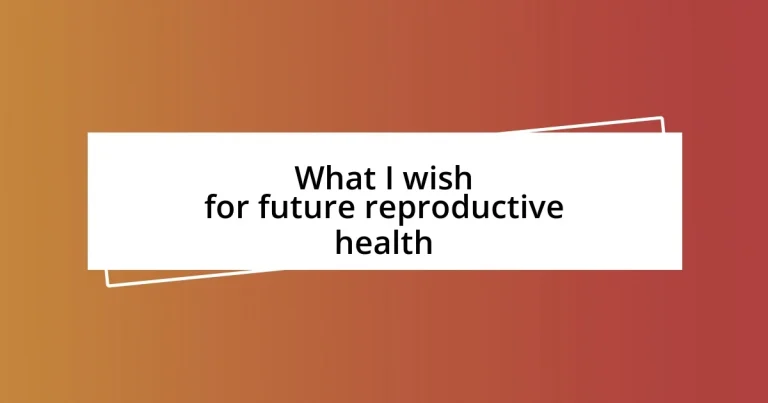Key takeaways:
- Universal access to reproductive health information and services, supported by telehealth and integrated education, can empower individuals and reshape societal attitudes.
- Improving access through mobile clinics, affordability initiatives, and cultural competency in healthcare is crucial for marginalized communities.
- Community involvement through education, peer support groups, and policy advocacy can significantly enhance reproductive health equity and awareness.
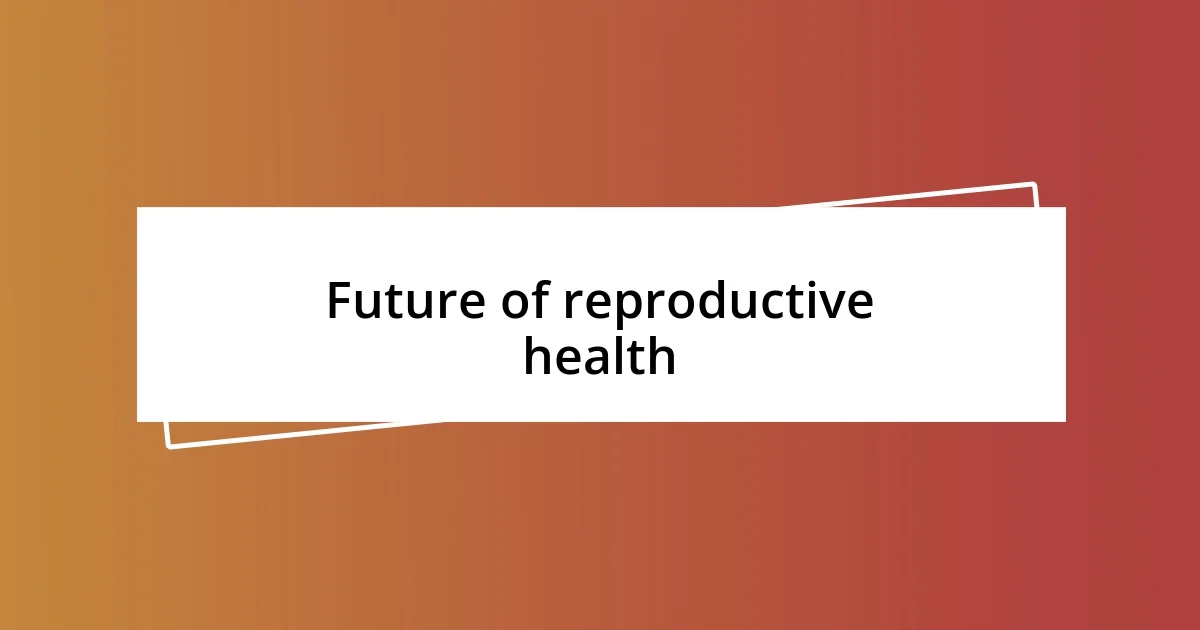
Future of reproductive health
I envision a future of reproductive health where access to information and services is universal. Imagine a world where every individual can freely discuss their reproductive health without stigma. Personally, I’ve seen how the right conversation can empower someone to seek the care they deserve.
As technology evolves, I believe telehealth will play a significant role in this field. Picture being able to consult with a specialist from the comfort of your home, eliminating the barriers of distance and inconvenience. I remember a friend who struggled to find a gynecologist in a rural area; if telehealth had been an option back then, it could have changed her entire experience.
Furthermore, the integration of education on reproductive rights into school curriculums could reshape societal attitudes. Are we ready for future generations to grow up without the misconceptions that often surround reproductive health? Reflecting on my own school experience, a comprehensive approach might have sparked earlier awareness, leading to healthier choices and empowerment.
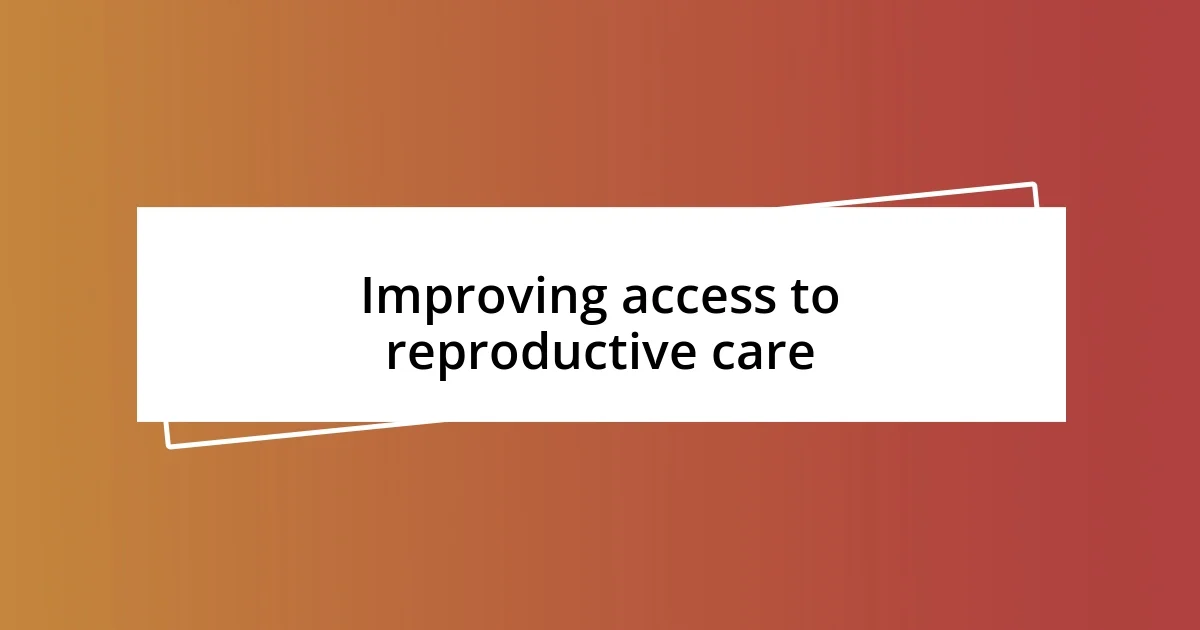
Improving access to reproductive care
Improving access to reproductive care is crucial for empowering individuals, regardless of where they live. In my experience, many communities lack nearby healthcare facilities, so mobile clinics could provide essential services directly to those in need. I still recall visiting a pop-up clinic in my neighborhood that provided screenings and counseling for reproductive health; the relief on people’s faces was palpable when they realized help was within reach.
Affordability also plays a key role in access. I remember a conversation with a college friend who had to choose between paying for birth control or her textbooks. This stark choice highlighted the need for initiatives that make reproductive care more financially accessible. Implementing sliding scale fees and improving insurance coverage can significantly change lives, ensuring that cost is not a barrier to necessary services.
Moreover, cultural competency in healthcare can make a world of difference. I once attended a workshop on providing inclusive reproductive care, and it opened my eyes to the unique challenges faced by marginalized communities. When healthcare providers understand and respect cultural differences, it lays a foundation for trust. This could lead to more people seeking the care they need, ultimately improving overall health outcomes.
| Key Factor | Potential Solutions |
|---|---|
| Accessibility | Mobile clinic services in underserved areas |
| Affordability | Sliding scale fees and comprehensive insurance coverage |
| Cultural Competency | Training healthcare providers on inclusivity |
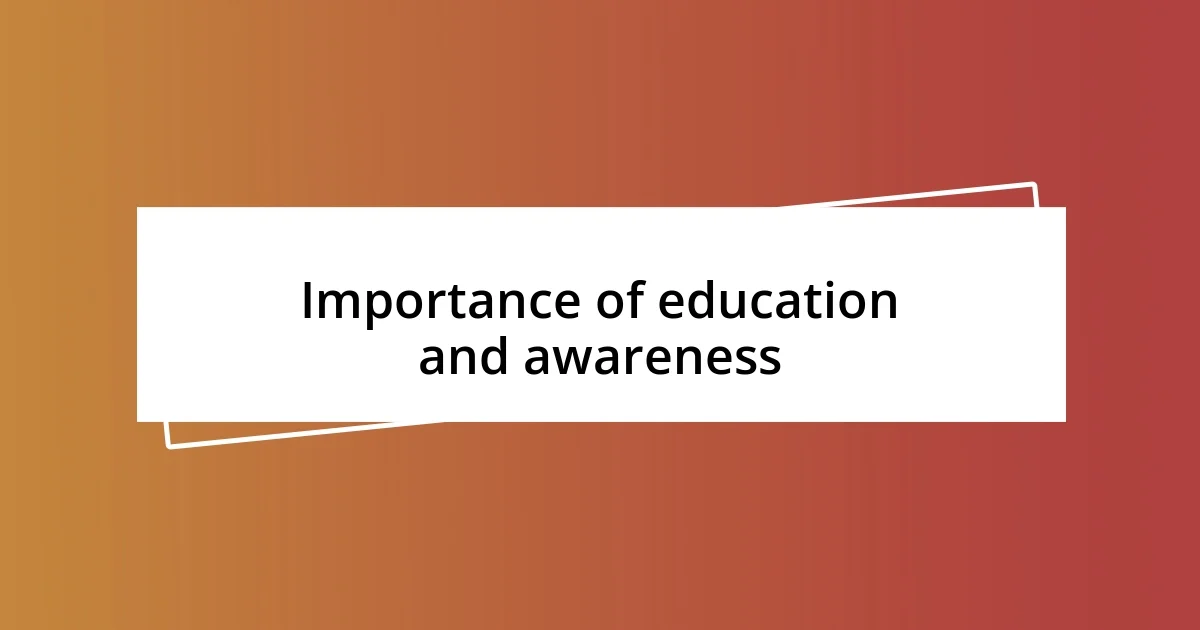
Importance of education and awareness
Education and awareness are vital components in shaping the future of reproductive health. I’ve observed that when people are informed, they can make better choices regarding their bodies and well-being. For instance, a friend once shared how learning about menstrual health transformed her experience; she felt empowered to advocate for herself during medical appointments, resulting in a more satisfying and informed healthcare journey.
- Comprehensive sexual education can reduce stigma and misconceptions.
- Information about reproductive rights should be widely available.
- Community workshops can engage individuals and foster open conversations.
- Access to reliable online resources is essential for ongoing education.
In my experience, the difference that education makes can be profound. I remember attending a community discussion on reproductive issues, where people from different backgrounds shared their stories. It opened my eyes to the variety of experiences and challenges others face, igniting a shared sense of support and understanding. When people are educated, they feel more confident participating in their reproductive health decisions, leading to a ripple effect of positive change within their communities.
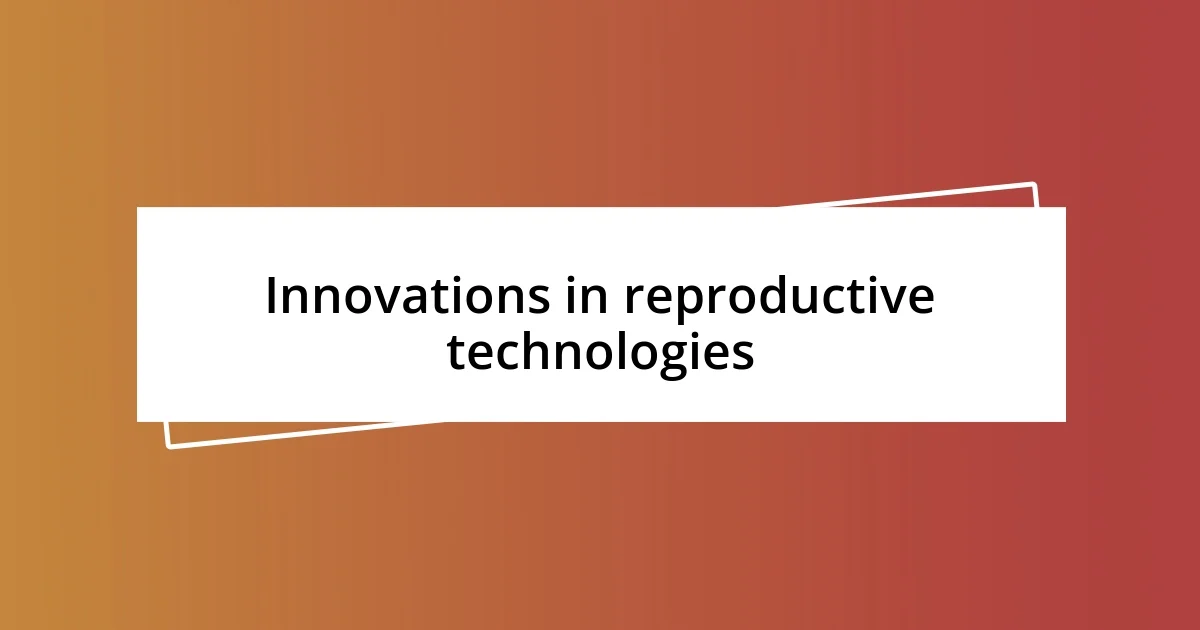
Innovations in reproductive technologies
The landscape of reproductive technologies is evolving rapidly, showcasing groundbreaking innovations that could change lives. For example, I recently came across the concept of artificial intelligence in fertility treatments. It’s fascinating to think about how AI can analyze an individual’s unique reproductive patterns, offering tailored insights that help optimize chances of conception. When I heard about couples who had struggled for years finally finding success through these personalized approaches, it truly struck a chord with me. It made me realize how much hope technology can bring to those in desperate need.
One innovation that genuinely excites me is the development of three-parent IVF, which aims to prevent genetic diseases. Imagine being able to select the healthiest genes from three individuals to create a baby that’s not only free from hereditary conditions but also potentially more resilient. I once spoke to a family affected by such diseases, and their desire for a healthy future for their children is heartbreaking. Innovations like this could open doors for families who previously felt hopeless. Wouldn’t it be incredible to think that technology could provide solutions where nature fell short?
Additionally, the concept of gene-editing technologies, such as CRISPR, continues to prompt discussions about ethical boundaries in reproductive health. While it offers the promise of eradicating certain genetic disorders, it also raises important questions. I often wonder about the implications of “perfecting” embryos—will it lead to new forms of inequality? Engaging in these discussions is crucial as we navigate this uncharted territory, blending hope with caution as we embrace the future of reproductive technologies.
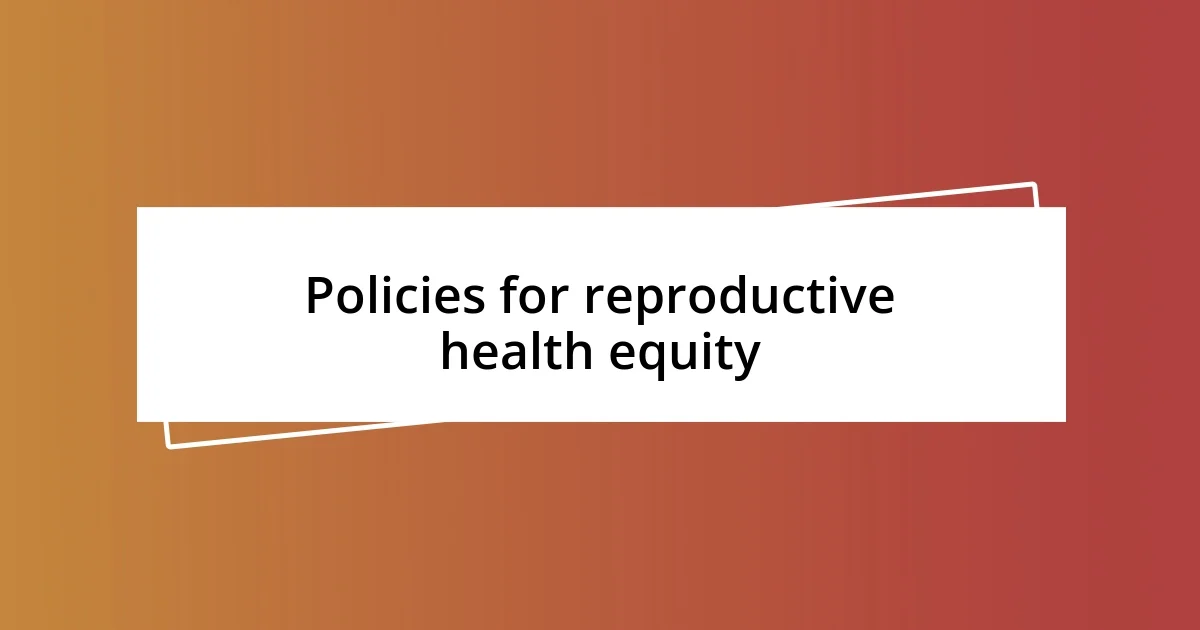
Policies for reproductive health equity
Creating policies that promote reproductive health equity is essential for addressing the disparities many face today. I often think about the individuals in my community who struggle to access basic reproductive health services, impacting their quality of life. What if we had policies in place that ensured everyone, regardless of their socio-economic status, could receive comprehensive reproductive healthcare? I believe that ideally, public policies should prioritize funding for clinics in underserved areas, which directly impacts accessibility and trust in the healthcare system.
One area that I find particularly important is the integration of reproductive health services into primary care. I remember a conversation with a healthcare provider who mentioned how comprehensive care could help destigmatize reproductive health issues. By making services like family planning and STI screenings part of routine check-ups, we can normalize these discussions and encourage individuals to prioritize their sexual health without fear or embarrassment. Wouldn’t it be groundbreaking if these policies shifted societal norms around reproductive health?
Moreover, I think about the role of reproductive health legislation and how it can either empower or hinder progress. When I learned about the recent laws mandating paid maternity leave, I saw firsthand how that supported not just mothers but families as a whole. It raises a thought: how many individuals would seize the opportunity of starting a family if they felt secure in their job and financial stability? Policies that ensure affordable childcare and parental leave could radically change reproductive choices, leading to healthier families and happier lives.
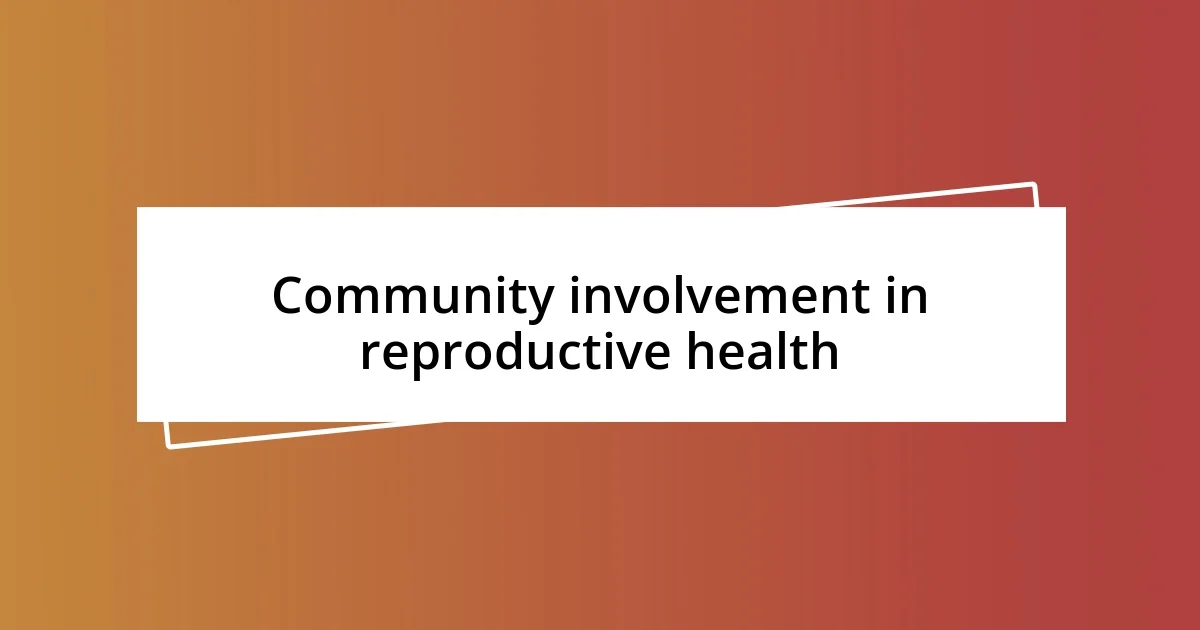
Community involvement in reproductive health
Joining the conversation around community involvement in reproductive health feels incredibly vital. I remember attending a local health fair where community members came together to share knowledge and resources. It was inspiring to see individuals from diverse backgrounds discussing their reproductive health experiences. This kind of grassroots engagement fosters understanding and solidarity, making it easier for people to voice their needs and concerns about reproductive issues.
Moreover, I often think about how community leaders can act as champions in promoting reproductive health education. During a recent workshop at a community center, a local advocate spoke passionately about empowering young people to make informed choices regarding their bodies. His enthusiasm resonated with many—could you imagine the shifts we could create in society if we normalized these discussions from an early age? Increased awareness leads to informed decision-making, and that’s truly empowering.
Implementing peer support groups is another powerful way to enhance community involvement. I was part of a group where individuals openly shared their reproductive health journeys, which helped break down many stigmas associated with these topics. Seeing the transformation in people as they found camaraderie and understanding was a gift. How can we scale these initiatives to reach more people? It’s clear to me that when communities come together to support each other, the impact on reproductive health can be profound and lasting.











